Navigation
Install the app
How to install the app on iOS
Follow along with the video below to see how to install our site as a web app on your home screen.
Note: This feature may not be available in some browsers.
More options
Style variation
-
Congratulations TugboatEng on being selected by the Eng-Tips community for having the most helpful posts in the forums last week. Way to Go!
You are using an out of date browser. It may not display this or other websites correctly.
You should upgrade or use an alternative browser.
You should upgrade or use an alternative browser.
LU decomposition
- Thread starter hoshang
- Start date
- Status
- Not open for further replies.
GregLocock
Automotive
I suggest you use a screenshot, smiley emoticons don't help.
Here's some Octave
>> M=[.5,-1,0;-1,-1,-1;0,-1,0.5]
M =
0.5000 -1.0000 0
-1.0000 -1.0000 -1.0000
0 -1.0000 0.5000
>> [L,U]=lu(M)
L =
-0.5000 1.0000 0
1.0000 0 0
0 0.6667 1.0000
U =
-1.0000 -1.0000 -1.0000
0 -1.5000 -0.5000
0 0 0.8333
>> M=[-.5,-1,0;-1,-1,-1;0,-1,0.5]
M =
-0.5000 -1.0000 0
-1.0000 -1.0000 -1.0000
0 -1.0000 0.5000
>> [L,U]=lu(M)
L =
0.5000 0.5000 1.0000
1.0000 0 0
0 1.0000 0
U =
-1.0000 -1.0000 -1.0000
0 -1.0000 0.5000
0 0 0.2500
>> M=[1.5,-1,0;-1,-1,-1;0,-1,0.5]
M =
1.5000 -1.0000 0
-1.0000 -1.0000 -1.0000
0 -1.0000 0.5000
>> [L,U]=lu(M)
L =
1.0000 0 0
-0.6667 1.0000 0
0 0.6000 1.0000
U =
1.5000 -1.0000 0
0 -1.6667 -1.0000
0 0 1.1000
>>
Cheers
Greg Locock
New here? Try reading these, they might help FAQ731-376
Here's some Octave
>> M=[.5,-1,0;-1,-1,-1;0,-1,0.5]
M =
0.5000 -1.0000 0
-1.0000 -1.0000 -1.0000
0 -1.0000 0.5000
>> [L,U]=lu(M)
L =
-0.5000 1.0000 0
1.0000 0 0
0 0.6667 1.0000
U =
-1.0000 -1.0000 -1.0000
0 -1.5000 -0.5000
0 0 0.8333
>> M=[-.5,-1,0;-1,-1,-1;0,-1,0.5]
M =
-0.5000 -1.0000 0
-1.0000 -1.0000 -1.0000
0 -1.0000 0.5000
>> [L,U]=lu(M)
L =
0.5000 0.5000 1.0000
1.0000 0 0
0 1.0000 0
U =
-1.0000 -1.0000 -1.0000
0 -1.0000 0.5000
0 0 0.2500
>> M=[1.5,-1,0;-1,-1,-1;0,-1,0.5]
M =
1.5000 -1.0000 0
-1.0000 -1.0000 -1.0000
0 -1.0000 0.5000
>> [L,U]=lu(M)
L =
1.0000 0 0
-0.6667 1.0000 0
0 0.6000 1.0000
U =
1.5000 -1.0000 0
0 -1.6667 -1.0000
0 0 1.1000
>>
Cheers
Greg Locock
New here? Try reading these, they might help FAQ731-376
- Thread starter
- #3
GregLocock
Automotive
>> M=[-.5,-1,0;-1,-1,-1;0,-1,-0.5]
M =
-0.5000 -1.0000 0
-1.0000 -1.0000 -1.0000
0 -1.0000 -0.5000
>> [L,U]=lu(M)
L =
0.5000 0.5000 1.0000
1.0000 0 0
0 1.0000 0
U =
-1.0000 -1.0000 -1.0000
0 -1.0000 -0.5000
0 0 0.7500
Which is a very strange result, L is not triangular. Sorry I don't know enough about lu to explain what that means.
Cheers
Greg Locock
New here? Try reading these, they might help FAQ731-376
M =
-0.5000 -1.0000 0
-1.0000 -1.0000 -1.0000
0 -1.0000 -0.5000
>> [L,U]=lu(M)
L =
0.5000 0.5000 1.0000
1.0000 0 0
0 1.0000 0
U =
-1.0000 -1.0000 -1.0000
0 -1.0000 -0.5000
0 0 0.7500
Which is a very strange result, L is not triangular. Sorry I don't know enough about lu to explain what that means.
Cheers
Greg Locock
New here? Try reading these, they might help FAQ731-376
Using the Scipy.Linalg LU function via Excel:
If I set permute_I to false I get the same as hoshang:
Lower =
1 0 0
-0 1 0
0.5 0.5 1
Upper =
-1 -1 -1
0 -1 -0.5
0 0 0.75
If I set permute_I to true I get the same as greg:
Permuted Lower =
0.5 0.5 1
1 0 0
-0 1 0
Upper =
-1 -1 -1
0 -1 -0.5
0 0 0.75
So greg's results give the permuted lower matrix. I'd have to remind myself of how these things work to know what you do with that.
Where did the values:
L=
1 0 0
2 1 0
0 -1 1
come from?
Doug Jenkins
Interactive Design Services
If I set permute_I to false I get the same as hoshang:
Lower =
1 0 0
-0 1 0
0.5 0.5 1
Upper =
-1 -1 -1
0 -1 -0.5
0 0 0.75
If I set permute_I to true I get the same as greg:
Permuted Lower =
0.5 0.5 1
1 0 0
-0 1 0
Upper =
-1 -1 -1
0 -1 -0.5
0 0 0.75
So greg's results give the permuted lower matrix. I'd have to remind myself of how these things work to know what you do with that.
Where did the values:
L=
1 0 0
2 1 0
0 -1 1
come from?
Doug Jenkins
Interactive Design Services
GregLocock
Automotive
Of course the qick check is to do L*U, but we don't know what U is for
L=
1 0 0
2 1 0
0 -1 1
Cheers
Greg Locock
New here? Try reading these, they might help FAQ731-376
L=
1 0 0
2 1 0
0 -1 1
Cheers
Greg Locock
New here? Try reading these, they might help FAQ731-376
The results from Mathcad 14 are the same, and the extracted L, U, and P matrices behave as expected with P*M = L*U
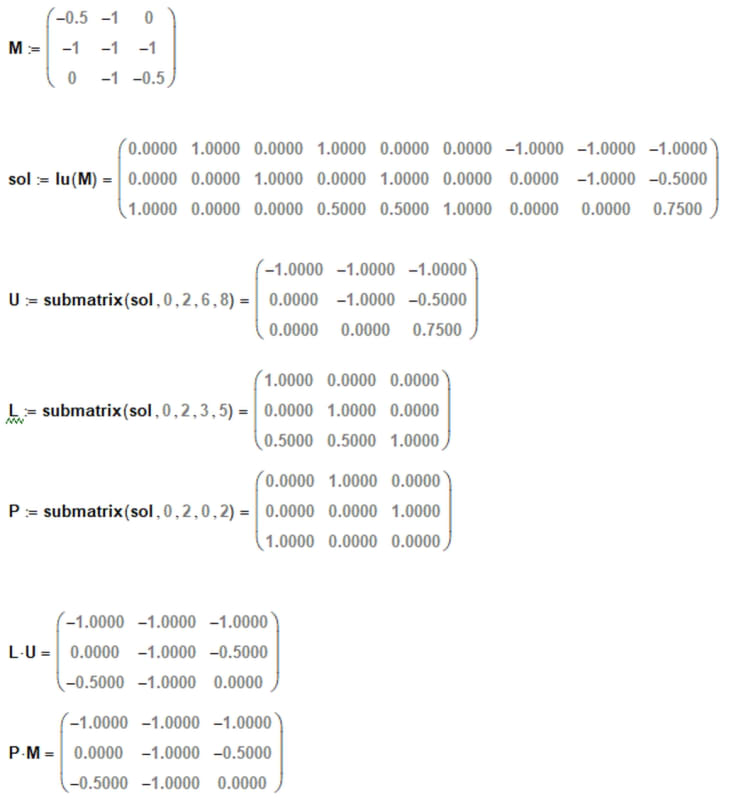
TTFN (ta ta for now)
I can do absolutely anything. I'm an expert! faq731-376 forum1529 Entire Forum list

TTFN (ta ta for now)
I can do absolutely anything. I'm an expert! faq731-376 forum1529 Entire Forum list
- Thread starter
- #8
Thanks. Review any textbooks on LU decomposition. You will find out that the decomposition would beIDS said:Where did the values:
L=
1 0 0
2 1 0
0 -1 1
come from?
L=
1 0 0
2 1 0
0 -1 1
U=
-0.5 -1 0
0 1 -1
0 0 -1.5
OK, so Mathcad's LU decomposition is a general purpose decomposition, see
The function assumes that a permutation matrix P is required to make the decomposition work; this is why the lu() function returns 3 matrices.
TTFN (ta ta for now)
I can do absolutely anything. I'm an expert! faq731-376 forum1529 Entire Forum list
The function assumes that a permutation matrix P is required to make the decomposition work; this is why the lu() function returns 3 matrices.
TTFN (ta ta for now)
I can do absolutely anything. I'm an expert! faq731-376 forum1529 Entire Forum list
OK, so it seems the answer to the question:
I wonder why LU for this matrix retrieves such LU decomposition result.
is that there is more than one way to decompose a matrix.
It seems that Scipy and Octave are using a pivotted lower matrix, so that for an original matrix A:
PLU = A
whereas for hoshang's matrices:
LU = A
Excel screen shot, calling Scipy fumctions:
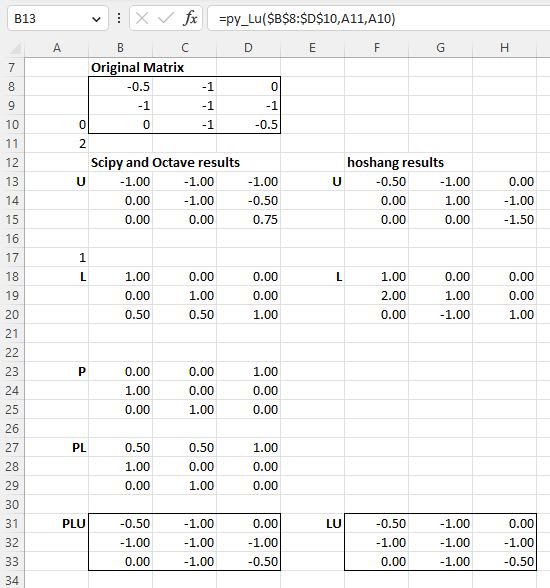
Apparently Mathcad is doing something different, but I don't have Mathcad to see what is going on there.
Doug Jenkins
Interactive Design Services
I wonder why LU for this matrix retrieves such LU decomposition result.
is that there is more than one way to decompose a matrix.
It seems that Scipy and Octave are using a pivotted lower matrix, so that for an original matrix A:
PLU = A
whereas for hoshang's matrices:
LU = A
Excel screen shot, calling Scipy fumctions:

Apparently Mathcad is doing something different, but I don't have Mathcad to see what is going on there.
Doug Jenkins
Interactive Design Services
Mathcad is doing P*M = L*U, and the link I posted indicates that when LU decomposition is possible, there may be multiple solutions, and P in Mathcad's case is the inverse of the P in Doug's example, as can be seen below
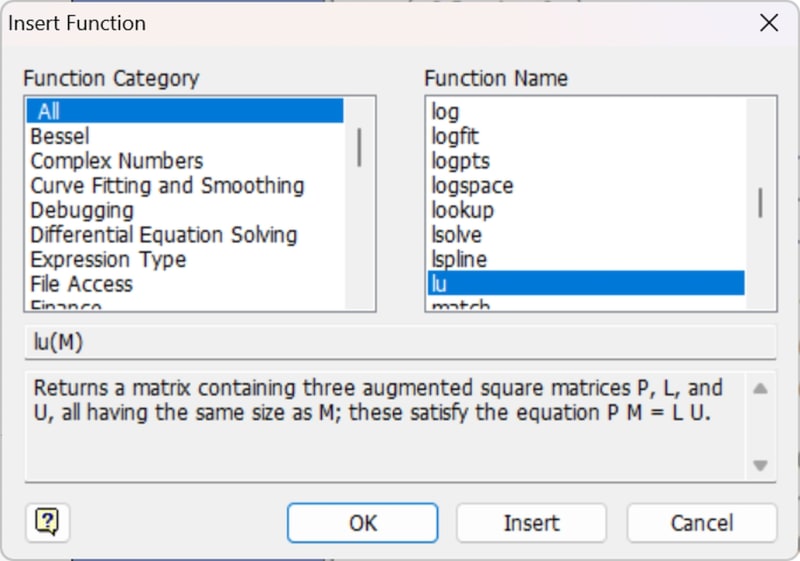
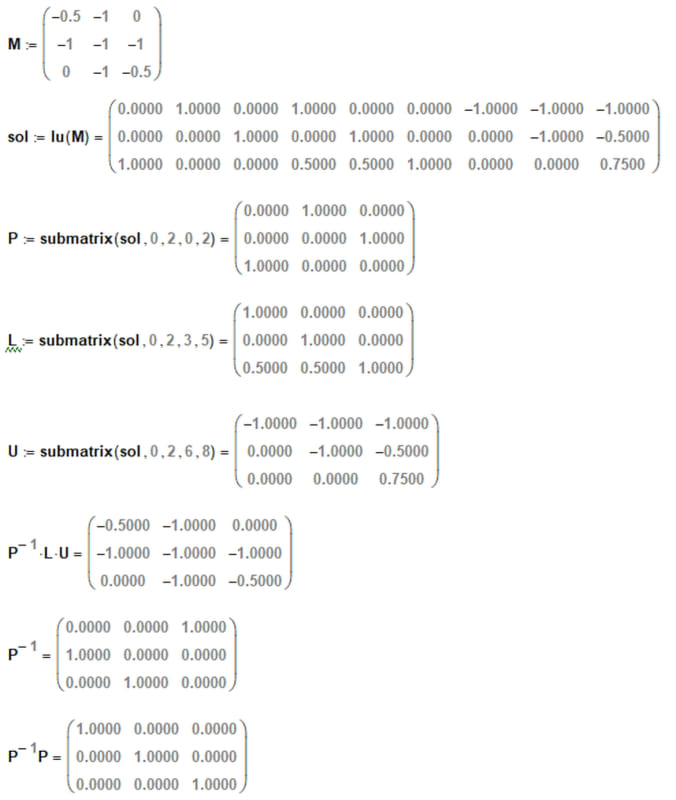
TTFN (ta ta for now)
I can do absolutely anything. I'm an expert! faq731-376 forum1529 Entire Forum list


TTFN (ta ta for now)
I can do absolutely anything. I'm an expert! faq731-376 forum1529 Entire Forum list
Thanks IRstuff
I have updated my spreadsheet to include the Mathcad way.
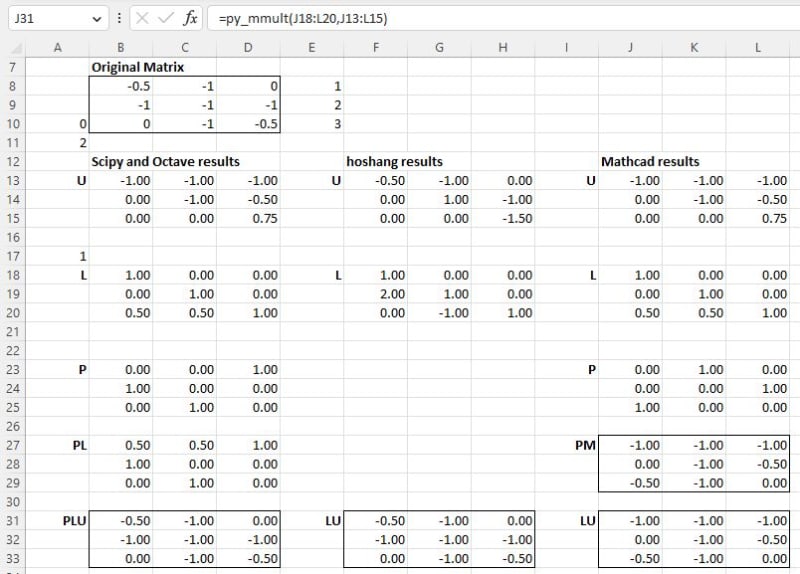
Doug Jenkins
Interactive Design Services
I have updated my spreadsheet to include the Mathcad way.

Doug Jenkins
Interactive Design Services
This writeup goes into some more detail
TTFN (ta ta for now)
I can do absolutely anything. I'm an expert! faq731-376 forum1529 Entire Forum list
TTFN (ta ta for now)
I can do absolutely anything. I'm an expert! faq731-376 forum1529 Entire Forum list
- Thread starter
- #14
hoshang said:So, how one can get hoshang results using Mathcad?
I can't help with Mathcad, but why do you want to?
Doug Jenkins
Interactive Design Services
This link has a good detailed description of the procedures for forming and solving LU matrices, with and without pivoting:
It has python code for each stage of the process.
At the moment I'm having trouble getting their lu_decomp function to work. If anyone get's it working, please let me know.
.
Doug Jenkins
Interactive Design Services
It has python code for each stage of the process.
At the moment I'm having trouble getting their lu_decomp function to work. If anyone get's it working, please let me know.
.
Doug Jenkins
Interactive Design Services
IDS said:At the moment I'm having trouble getting their lu_decomp function to work. If anyone get's it working, please let me know.
I have now got their code working. In the lu_decomp function:
Replace the two lines using np.block as below:
Python:
# L = np.block([[L11, L12], [L21, L22]])
# U = np.block([[U11, U12], [U21, U22]])
L = np.zeros((n,n))
U = np.zeros((n,n))
L[0,0] = L11
L[0,1:] = L12
L[1:,0] = L21
L[1:,1:] = L22
U[0,0] = U11
U[0,1:] = U12
U[1:,0] = U21
U[1:,1:] = U22
return (L, U)Also in the forward_sub function, replace:
for j in range(i-1):
with
for j in range(i):
With those changes the functions I tried seem to work correctly:
forward_sub
back_sub
lu_solve
lu_decomp
I haven't yet tried the functions using pivoting (but I'm working on it).
Doug Jenkins
Interactive Design Services
- Thread starter
- #18
Your original post has one questioned that has been answered in detail.
If you have remaining concerns perhaps you might tell us what they are.
Doug Jenkins
Interactive Design Services
If you have remaining concerns perhaps you might tell us what they are.
Doug Jenkins
Interactive Design Services
You're just going to have to do your own LU decomposition.
TTFN (ta ta for now)
I can do absolutely anything. I'm an expert! faq731-376 forum1529 Entire Forum list
TTFN (ta ta for now)
I can do absolutely anything. I'm an expert! faq731-376 forum1529 Entire Forum list
- Status
- Not open for further replies.
